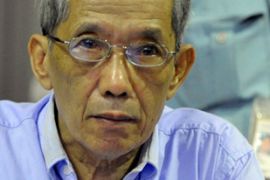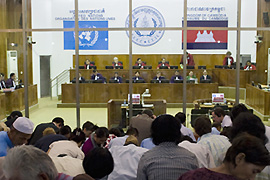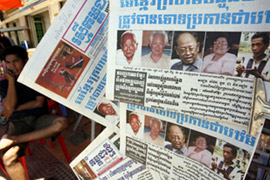Landmark Khmer Rouge trial opens
Prison chief is first member of regime to face war crimes charges at UN-backed court.

He had been driven to the court from a nearby villa where he is being held with four other Khmer Rouge leaders, who will each face trial later this year.
Significant trial
Duch’s trial is a momentous event in a country where at least 1.7 million people – about a fifth of the country’s population – died from starvation, disease or execution during the Khmer Rouge’s rule from 1975 to 1979.
| IN DEPTH |
|
Video: |
The trial is being carried live on Cambodian television, although the first witness is not expected to be called for weeks or possibly months. A verdict is not expected before September.
Duch has admitted atrocities were carried out, but has said he was only following orders from superiors.
A former maths teacher, he headed the S-21 prison, the largest Khmer Rouge interrogation facility, where at least 14,000 men, women and children were detained and tortured.
Today the prison, a former high school, has been converted into a museum of the atrocities committed by the Khmer Rouge.
Many of the centre’s victims were executed in what later became known as the Killing Fields.
Selina Downes, Al Jazeera’s correspondent reporting from outside the courtroom, said the trial had long been awaited by Cambodians.
“There was an air of anticipation and expectation that something significant was taking place, as survivors, victims families, the world’s media and human rights groups shared space inside and outside the court,” she said.
“Inside, mostly procedural things were sorted out [so that] witnesses can be called, expected next month. Some of those witnesses were in court today simply to monitor proceedings. They are seeking justice – many people here want answers to questions that remain.”
Prison regime
Theary Seng, an executive director of Cambodia’s Centre for Social Development, was among those who were imprisoned during the rule of the Khmer Rouge.
 |
| Hundreds of survivors of the Khmer Rouge watched the trial begin [AFP] |
“I remember most clearly the time I was in prison; I was seven years old. We were in prison for five months,” she told Al Jazeera.
“We were detained in the eastern zone where many, many purges were taking place. The eastern zone bordered Vietman, a sworn enemy of the Khmer Rouge.
“All the prisoners were killed except for my brother and I. We were children. For whatever inexplicable reason, they wanted to save the children and preserve us.”
Duch’s testimony is expected to be vital in securing the convictions of four other accused Khmer Rouge leaders held awaiting trial before the tribunal.
They include Nuon Chea, the group’s former deputy leader also known as Brother Number Two; Khieu Samphan, the former Khmer Rouge head of state; Ieng Sary, the former foreign minister; and his wife Ieng Thirith, who was the social affairs minister.
All have denied committing any crimes.
Pol Pot, the group’s former supreme leader and Brother Number One, died in a jungle hideout in 1998.
After the fall of the Khmer Rouge in 1979, Duch disappeared for 20 years living under aliases and converting to Christianity before he was located in northwestern Cambodia by a British journalist in 1999.
Last chance
The joint war crimes tribunal, established in 2006 after nearly a decade of negotiations between Cambodia and the UN, is seen as the final chance for Cambodians to see justice done for the Khmer Rouge’s atrocities.
 |
| Ordinary Cambodians have long awaited justice over the mass killings of civilians [Reuters] |
But the run-up to the trial has been marred by claims that the government is interfering to stop the prosecution of further suspects, as well as allegations that Cambodian court staff were paid kickbacks for their jobs.
“Any hint of political manipulation at the tribunal will undermine its credibility with the Cambodian people,” Sara Colm, a Cambodia-based senior researcher at Human Rights Watch, said.
“Until allegations of corruption and improper interference by the government are investigated and resolved, the tribunal’s integrity as a legitimate and independent court will remain in question.”
But for ordinary Cambodians, the trial remains their only chance to heal the wounds of a traumatic period that saw almost a quarter of the population wiped out.
“The court provides a very clear example of the very theoretical or intangible idea of justice,” Theary said.
“Justice needs to be seen to be done – the court is one physical example of what that means … To witness that is satisfying.”
